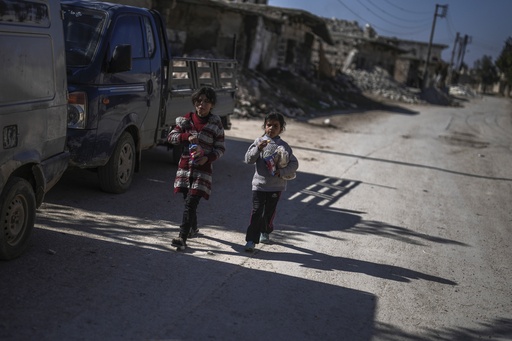
PARIS — An international conference is taking place in Paris on Thursday, bringing together Western allies and Arab nations to discuss Syria’s future following the removal of former President Bashar Assad and amidst ongoing uncertainty regarding the United States’ role in the region.
This marks the third such conference on Syria since Assad was ousted in December and the first following the transition to the Trump administration in the U.S.
Concerns have escalated regarding Syria, which relies heavily on U.S. aid, following Trump’s controversial move to suspend foreign assistance. This suspension jeopardizes the support that the war-torn nation had depended upon, leaving it in significant distress after years of civil conflict.
The Trump administration has begun withdrawing nearly all USAID staff globally, effectively bringing to a close a six-decade initiative aimed at enhancing American security by combating hunger, supporting education, and addressing disease outbreaks.
While many Syrians welcomed the abrupt end of Assad’s regime, experts caution that the new leadership may face challenges ahead if they fail to rejuvenate the country’s devastated economy. The lifting of sanctions imposed during Assad’s rule is critical for this recovery, but sanctions are not the sole problem.
There is a pressing need for substantial financial assistance to facilitate peaceful reconstruction in the wake of Assad’s downfall. After nearly 14 years of conflict, Syria requires extensive investments to restore housing, electricity, water, and transportation systems. The United Nations estimated in 2017 that the reconstruction costs would exceed $250 billion, though some experts now suggest the figure could reach $400 billion.
With minimal productive sectors and government salaries around $20 per month, Syrians have increasingly relied on remittances and humanitarian support. However, following the suspension of U.S. foreign aid last month, the flow of assistance has significantly decreased.
The consequences of this funding freeze have been particularly severe in northwest Syria, a region previously controlled by rebels and housing millions displaced by war. Many of these individuals reside in large tent camps.
The halt in USAID funding has led to the closure of clinics serving these camps, resulting in job losses for local nonprofit workers. Additionally, operational services were briefly suspended at a camp for family members of Islamic State fighters in northeastern Syria due to the disrupted support.
In conjunction with the conference, a workshop will convene key donors from the Group of Seven industrialized nations, the United Nations, and major Arab agencies to streamline international aid efforts for Syria.
Concerns also linger about the future of U.S. military support in the region. In 2019, Trump initiated a partial withdrawal of U.S. forces from northeastern Syria, although he later reversed his decision. When the rebels were nearing the overthrow of Assad last December, Trump remarked that the U.S. should not become involved in the ongoing civil conflict.
As Syria’s new leader, Ahmad al-Sharaa, endeavors to solidify his authority, the United States’ intentions in the region remain ambiguous. A French diplomatic official confirmed attendance from a U.S. representative at the conference but indicated that the new administration is still reviewing its stance on Syria, leaving clarity regarding U.S. policy elusive.
The head of the primary U.S.-backed force in Syria recently asserted that U.S. troops should remain in the region to prevent the resurgence of the Islamic State group.
Since the fall of Damascus on December 8, and Assad’s subsequent escape to Moscow, the new governing body has yet to present a coherent strategy for the nation’s governance.
Hayat Tahrir al-Sham, previously affiliated with al-Qaida and recognized as a terrorist group by the EU and U.N., has emerged as the de facto authority in Syria, having collaborated with southern fighters during the offensive late last year.
French officials state that the conference will focus on three primary objectives: coordinating support for a peaceful political transition, fostering cooperation and aid from neighboring countries and partners, and sustaining discussions on combating impunity.
This conference is set at a ministerial level, with Syria’s interim foreign minister Asaad al-Shibani attending, marking his inaugural visit to Europe.
While addressing the World Governments Summit in Dubai, al-Shibani emphasized the new Damascus administration’s intent to enhance relations with the West and seek the removal of sanctions to facilitate reconstruction efforts in the aftermath of a prolonged and brutal war.

